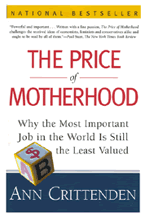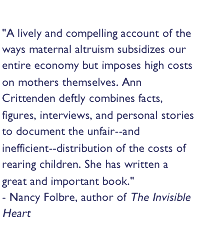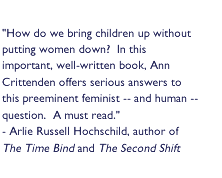 |
 Information
about Ann Crittenden's book: "The Price
of Motherhood" - now in paperback.
Information
about Ann Crittenden's book: "The Price
of Motherhood" - now in paperback.
|
 |
Award-winning economics journalist Ann
Crittenden's provocative and groundbreaking
THE PRICE OF MOTHERHOOD (Metropolitan
Books, paperback, 2002) has launched
a national discussion about the last
great obstacle to women's equality:
the utter failure of the United States
to acknowledge the immense value of
the unpaid and underpaid work of child-rearing.
Women may have won respect for their
accomplishments in the workplace, but
they have yet to win respect or material
recognition for their work at home.
Crittenden powerfully reveals the enormous
price that mothers, other caregivers,
our children, and society pay for this
economic disregard.
Crittenden clearly explains that almost
two-thirds of national wealth is created
by people, or "human capital."
The first and most important producers
of human capital are mothers and other
early caregivers, making them the greatest
wealth producers in the economy. Moreover,
research shows that the more resources
mothers have, the more resources will
be invested in human capital; ie: in
children's health and education. This
implies that strong, economically empowered
mothers are essential in building and
maintaining a strong economy. Yet American
institutions, from corporations to the
divorce courts to government social
policy, systematically work to keep
resources out of the hands of mothers,
and to keep them dependent. Drawing
on hundreds of interviews and the most
current research in economics, history,
sociology, child development, and family
law, Crittenden demonstrates that the
society that rhetorically praises "family
values" consistently devalues and
undermines the work it takes to make
a family.
For example, a college-educated person
who becomes the family's primary caregiver
stands to lose more than a million dollars
in lifetime income. Antiquated family
law deprives the primary caregiver of
financial equality in marriage, and
punishes her in divorce. Most childcare
is excluded from the GDP, at-home mothers
are not counted as part of the labor
force, and the social safety net excludes
mothers at home altogether. Crittenden
deftly dismantles the principal arguments
for the status quo: namely, that the
conditions surrounding motherhood are
a woman's choice. She proves that reducing
mothers' economic vulnerability would
enhance the welfare of all.
Ann Crittenden's THE PRICE OF MOTHERHOOD
elucidates a widely felt but inarticulated
problem and provides a galvanizing look
at the possibility of change.

More about the
book:
About
the Book
What You Didn't Know
In
Conversation with Ann
Press Release
Reader
Response
|
|
 |
|
|
|
 |

More about the book:
About the Book
What You Didn't Know
In Conversation
with Ann
Press Release
Reader Response




|

